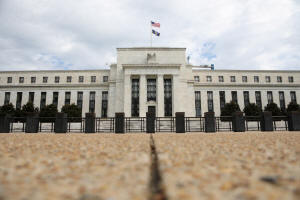|
Markets should now pay attention to the "endpoint" of rate
increases, not the pace of each move, and that endpoint is
likely still "a ways off," Waller said in response to a series
of questions on monetary policy at an economic conference
organized by UBS in Australia. "It depends on inflation."
"We're at a point we can start thinking maybe of going to a
slower pace," Waller said, but "we're not softening...Quit
paying attention to the pace and start paying attention to where
the endpoint is going to be. Until we get inflation down, that
endpoint is still a ways out there."
A report released last week showing slower than expected
inflation in October was "good news," but was "just one data
point" that would have to be followed with other similar
readings to show convincingly that inflation is slowing, he
said.
The 7.7% annualized increase in inflation recorded in October is
still "enormous," Waller said, noting that even if the Fed
scaled back from three quarter point increases to a half point
increase at its next meeting, "you're still going up."
"We're going to need to see a continued run of this kind of
behavior and inflation slowly starting to come down before we
really start thinking about taking our foot off the brakes,"
Waller said, adding that he has been further convinced the Fed
is on the right path because its rates increases so far have not
"broken anything."
The Fed has raised rates a total of 3.75 percentage points this
year beginning in March, including four three quarter point
increases, a rapid shift in monetary policy aimed to cool the
worst surge of inflation since the 1980s.
"For all the talk of crashing the economy and breaking the
financial markets. It hasn't done that," Waller said.
Analysts and economists have warned that the monetary tightening
will further the risk of recession, impacting employment.
U.S. Senate Banking Committee Chair Sherrod Brown last month
urged the Federal Reserve to be careful about tightening
monetary policy so much that millions of Americans already
suffering from high inflation also lose their jobs.
(Reporting by Howard Schneider; Editing by Aurora Ellis)
[© 2022 Thomson Reuters. All rights
reserved.]
This material may not be published,
broadcast, rewritten or redistributed.
Thompson Reuters is solely responsible for this content.

|
|





